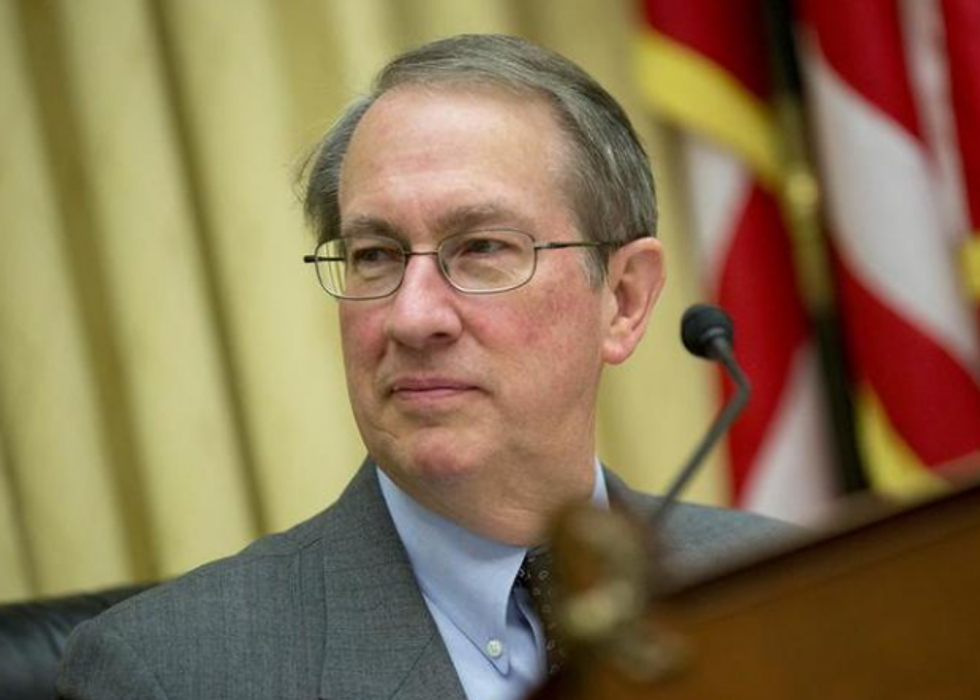
© 2025 Blaze Media LLC. All rights reserved.
Dozens of GOP members want a balanced budget amendment to the Constitution
January 13, 2015
Several House Republicans have proposed and cosponsored legislation that would amend the Constitution to require a balanced budget, and force Congress to hold supermajority votes whenever it wants to spend more than it takes in.
Changing the Constitution to require a balanced budget and give the United States a shot at paying down its $18 trillion debt seems in reach again, with Republican control of both the House and Senate.

Image: Bloomberg/Bloomberg via Getty Images
In 1995, the House passed a balanced budget amendment, and it came up just one vote short in the Senate. That vote still haunts supporters of an amendment, like Rep. Bob Goodlatte (R-Va.), who has proposed amendments in each Congress since 2007.
"Nearly 20 years ago, the U.S. Senate failed by one vote to pass a balanced budget constitutional amendment," he said last week. "If Congress had sent the amendment to the states for ratification in 1995, we would not be facing the fiscal crisis we are today and balancing the federal budget would be the norm rather than the exception."
Godlike has proposed two balanced budget amendments so far this year, including a tougher version that requires a three-fifths vote in Congress to spend more than the government collects, increase the debt ceiling, and raise taxes. It also caps total spending at 20 percent of GDP, unless two-thirds of Congress agrees to spend more.
That tougher version has 56 cosponsors, all Republicans.
Goodlatte also has a more moderate amendment requiring Congress not to spend more than it takes in, and requires a three-fifths majority to exceed that level or to raise the debt limit.
But it only requires a simple majority to raise taxes, and doesn't cap spending at a specific level of GDP.
This more moderate version won 261 votes in the House when it came up in the 112th Congress. It had 142 cosponsors in the 113th Congress, and as of this week it had 61 cosponsors, including one Democrat.
"I urge my colleagues to consider the impact that reckless spending has on our nation's future and on future generations," he said. "We should not pass on to our children and grandchildren the bleak fiscal future that our unsustainable spending is creating."
Several other Republicans have put forward their own balanced budget amendments, although none are as popular as Goodlatte's:
Rep. Vern Buchanan (R-Fla.) — One of the tougher versions out there. Spending could not exceed revenues unless two-thirds of the House and Senate agree. Total spending for any year would be capped at 18 percent of GDP, unless two-thirds of Congress agrees to spend more. Bills raising new revenue would also need a two-thirds vote. Rep. Billy Long (R-Mo.) is a cosponsor.
Rep. Bradley Byrne (R-Ala.) — spending can't exceed total tax receipts unless three-fifths of the House and Senate vote otherwise. Total spending also can't exceed one-fifth GDP unless two-thirds of the House and Senate agree to exceed that. Bills to increase revenues and increase the debt ceiling would also require a three-fifths vote.
Rep. Leonard Lance (R-N.J.) — Three-fifths votes are needed to spend more than is collected, increase the debt ceiling, and raise revenue. Reps. Jeff Duncan (R-S.C.) and Bill Huizenga (R-Mich.) are cosponsors.
Rep. David Schweikert (R-Ariz.) — Similar to Buchanan's proposal, spending could not exceed revenues unless two-thirds of Congress agree, and spending is capped at 18 percent of GDP. New revenues and debt ceiling hikes also need a two-thirds vote.
Sen. Mike Lee (R-Utah) — a companion bill to Buchanan's, with Sen. David Vitter (R-La.).
Below are copies of Goodlatte's two proposals, H.J.Res. 1 and H.J.Res. 2:
Want to leave a tip?
We answer to you. Help keep our content free of advertisers and big tech censorship by leaving a tip today.
Want to join the conversation?
Already a subscriber?
more stories
Sign up for the Blaze newsletter
By signing up, you agree to our Privacy Policy and Terms of Use, and agree to receive content that may sometimes include advertisements. You may opt out at any time.
Related Content
© 2025 Blaze Media LLC. All rights reserved.
Get the stories that matter most delivered directly to your inbox.
By signing up, you agree to our Privacy Policy and Terms of Use, and agree to receive content that may sometimes include advertisements. You may opt out at any time.





